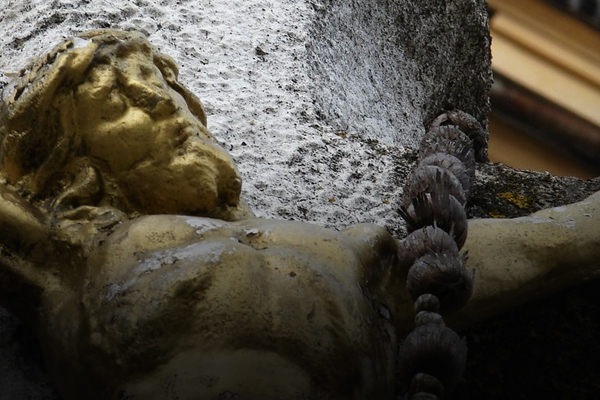
“…if Christ has not been raised, then our preaching is vain, your faith also is vain. Moreover we are even found to be false witnesses of God, because we testified against God that He raised Christ, whom He did not raise, if in fact the dead are not raised.” (1 Corinthians 15:14-15)
I was in a surveillance vehicle in south central Los Angeles, working a case and taking a break. I was passing some time reading a Bible I purchased after listening to a message from a local pastor. As soon as I read this passage, I knew I would have to start a very different kind of investigation. I was familiar with the claims of Christianity: Jesus allegedly rose from the dead after being executed on a Roman cross. I didn’t believe it, but this ancient Biblical author apparently did, and he seemed to be challenging me to investigate the Resurrection. If the alleged eyewitnesses of the risen Christ were lying (speaking as “false witnesses”), the claims of the New Testament were in “vain” and the faith of Christians – however well intended they might be – were “also in vain.” If the claims about Jesus were true, on the other hand, everything I thought I knew as an atheist would have to be reconsidered.
I decided to accept Paul’s challenge. I knew how to evaluate eyewitnesses to see if they were reliable, and I knew one of the most important areas to investigate was motive. People lie for specific reasons, and my experience as a detective taught me there were only three of these reasons:
Financial Greed
Many of the crimes (and lies) I’ve investigated over the years were motivated by the pursuit of money. Did this motivate the first Christians to lie about the Resurrection? Local believers in a variety of ancient communities wrote about the activities of the disciples following the Resurrection. None of these texts describe any of the disciples as men who possessed material wealth. Instead, they appear to have been chased from location to location, continually abandoning whatever property they owned. Even the earliest Christian records describe the followers as virtually homeless. Peter acknowledged as much when he told Jesus, “Behold, we have left our own homes and followed You” (Luke 18:28). Paul later reminded his readers that the apostles were “both hungry and thirsty, and [were] poorly clothed, and [were] roughly treated, and [were] homeless” (1 Cor. 4:11). The apostles lived “as unknown yet well-known, as dying yet behold, we live; as punished yet not put to death, as sorrowful yet always rejoicing, as poor yet making many rich, as having nothing yet possessing all things” (2 Cor. 6:9–10). In addition to this, all the nonbiblical accounts related to the lives of the apostles affirm the poverty of the disciples as they traveled the world to proclaim their testimony. If the disciples and apostles were lying for financial gain, their lies didn’t seem to be working.
Sex or Relationships
Sexual or relational desire is another powerful motivation for crimes and lies. But this second motivation seems just as unlikely as the first in explaining why the gospel authors would lie about the Resurrection. While the New Testament documents say little about the “love lives” of the apostolic eyewitnesses, we do know that Peter was married and had a mother-in-law (Matt. 8:14). Paul confirmed this and suggested that Peter wasn’t the only one who was married when, in his letter to the Corinthians, he asked, “Do we not have a right to take along a believing wife, even as the rest of the apostles and the brothers of the Lord and Cephas [Peter]?” (1 Cor. 9:5). The early-church fathers also suggested that the apostles were married, with the possible exception of the youngest apostle, John. It is clear from both the biblical record and the nonbiblical history that the apostles were careful to live their personal lives in a manner that was beyond reproach. The apostles weren’t using their position or testimony to gain sexual favors. If the apostles were motivated by sexual desire, there is certainly no record of it in the ancient writings of the time and no hint of it in their own texts.
The Pursuit of Power
There’s a third motivation for felonies and falsehoods: the desire to be powerful and respected. Given that the disciples had no apparent financial, sexual or relational motivations, I suspected this third category would explain their “lies”. Surely the early Christian leaders must have gained stature and power within their own religious communities. But, as I investigated the lives of the first-century apostles, I discovered the cost they paid for their leadership role. Power has its perks, not the least of which is the ability to protect oneself, yet this kind of power was never available to the apostles. The early Christian movement immediately faced hostility from the authorities. Tacitus, the ancient Roman historian wrote, for example, that Nero once “inflicted the most exquisite tortures on a class hated for their abominations, called Christians by the populace… Mockery of every sort was added to their deaths. Covered with the skins of beasts, they were torn by dogs and perished, or were nailed to crosses, or were doomed to the flames and burnt, to serve as a nightly illumination, when daylight had expired” (from his Annals, Book XV). The nonbiblical histories and writings related to the lives of the disciples consistently described them as persecuted and martyred for their testimony and leadership. The Biblical record is no different. Paul wrote that he was beaten with whips and rods, stoned, shipwrecked, endangered, mistreated, starved and sleep deprived (2 Cor. 11:24–28). As the apostles rose to positions of leadership, they made themselves the target of oppression and abuse. They received persecution rather than power.
By the time I finished investigating those who claimed to see Jesus rise from the grave, I realized that none of these eyewitnesses had a good reason to lie. While later believers were willing to die (as an act of faith) for what they did not see with their own eyes, the original eyewitnesses we willing to die (as an act of certainty) for what they did see. Their claims about the Resurrection were costly, and weren’t motivated by money, sex or power. Instead, their testimony cost them their comfort, their families, and ultimately their lives. The disciples' claims about the Resurrection were costly, and weren’t motivated by money, sex or power. Instead, their testimony cost them their comfort, their families, and ultimately their lives. Share on X
If the disciples didn’t have a good reason to lie about the Resurrection, what was my good reason not to believe them? I couldn’t find one. The more I learned about the historical evidence for Christianity, the more convicted I was about my own resistance to its claims. I eventually had to ask myself, “Am I resisting because there isn’t enough evidence to demonstrate this is true, or am I resisting because I just don’t want it to be true?” After examining the evidence, I knew it was the latter. I had constructed a series of prideful, intellectual barriers that prevented me from hearing the truth. Once those barriers were removed, I was able to recognize myself on the pages of Scripture: a fallen, rebellious, and prideful detective who didn’t want to admit he needed a Savior.
As I came to trust what the Bible said about the Resurrection of Jesus, I also came to trust what it said about me. I discovered my need for a Savior, even as I discovered the Savior, Himself.
This article first appeared in Decision Magazine

J. Warner Wallace is a Dateline featured Cold-Case Detective, Senior Fellow at the Colson Center for Christian Worldview, Adj. Professor of Christian Apologetics at Talbot School of Theology, Biola University, author of Cold-Case Christianity, God’s Crime Scene, and Forensic Faith, and creator of the Case Makers Academy for kids.
Subscribe to J. Warner’s Daily Email
J. Warner Wallace is a Dateline featured cold-case homicide detective, popular national speaker and best-selling author. He continues to consult on cold-case investigations while serving as a Senior Fellow at the Colson Center for Christian Worldview. He is also an Adj. Professor of Christian Apologetics at Talbot School of Theology, Biola University, and a faculty member at Summit Ministries. He holds a BA in Design (from CSULB), an MA in Architecture (from UCLA), and an MA in Theological Studies (from Gateway Seminary).







































Pingback: Were the Gospel Eyewitnesses Lying About the Resurrection? - The Poached Egg Christian Worldview and Apologetics Network
Pingback: TLC Today: Wednesday, April 1, 2020 – Northview Community Church
Pingback: क्या यीशु वास्तव में जी उठा था? – मार्ग सत्य जीवन